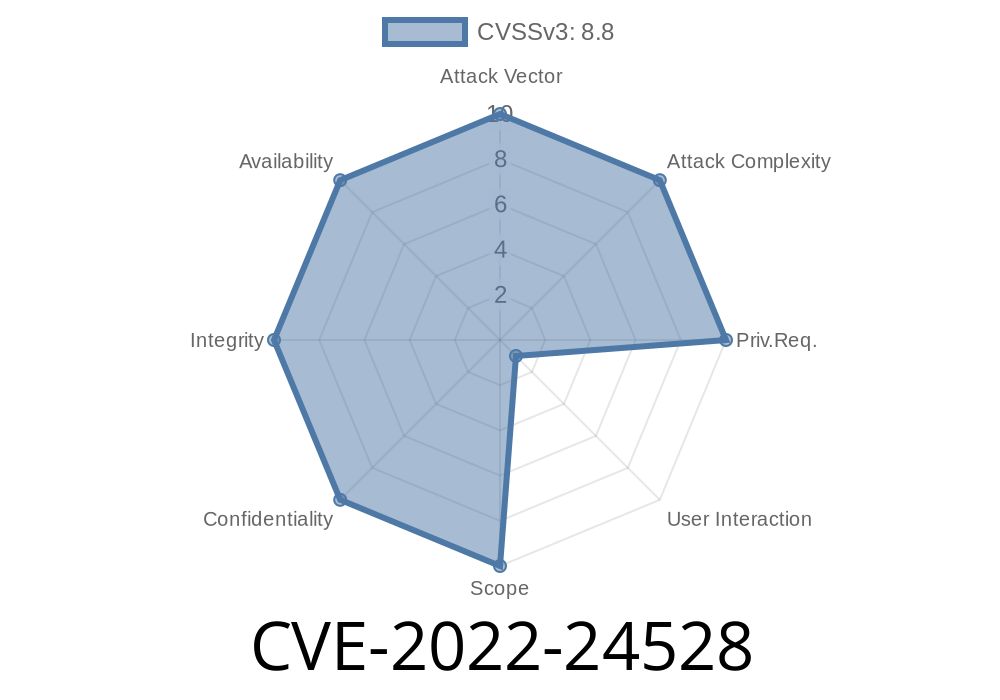In June 2022, Microsoft patched a critical security flaw identified as CVE-2022-24528 in its Remote Procedure Call (RPC) runtime. This issue received significant attention due to its potential for remote code execution (RCE), meaning attackers could take control of a vulnerable system over the network, without any physical access or user interaction.
While similar vulnerabilities—like CVE-2022-24492 and CVE-2022-26809—were also addressed in the same period, CVE-2022-24528 is a unique bug that deserves its own spotlight. This article aims to explain the nature of the vulnerability in simple terms, provide code snippets to understand the risk, link to official sources, and outline how an attacker could have exploited this issue.
What is RPC and Why Does it Matter?
RPC (Remote Procedure Call) is a protocol that lets one program request a service from another program, possibly on a different computer, without needing to understand all the network details. It's widely used in Windows environments.
Network management
If RPC is compromised, so is everything that depends on it.
Vulnerability Summary: CVE-2022-24528
CVE ID: CVE-2022-24528
Severity: Critical
Vector: Remote (over the network)
Impact: Remote Code Execution (RCE)
Authentication: Not required
User interaction: Not required
Patch released: June 14, 2022
Essentially, an attacker could send a carefully crafted RPC request to a target machine. If the request triggers the bug in the RPC runtime, the attacker could gain SYSTEM-level privileges—essentially full control of the machine.
How Does the Vulnerability Work?
Microsoft's advisory (link) doesn’t reveal many technical details, but based on patch analysis and open-source discussions, here’s a simplified breakdown:
The vulnerability is a buffer overflow problem in the RPC runtime.
- When handling some types of RPC messages, the service doesn’t correctly check how much data is being copied into memory.
- If sent a specially crafted request, the server will copy too much data into a too-small buffer. This can overwrite critical parts of memory and let the attacker run their own code.
Let’s imagine the vulnerable function looks like this (pseudocode)
void vulnerable_rpc_call(char *input, size_t input_length) {
char buffer[256];
// BAD: Doesn't check if input_length > 256
memcpy(buffer, input, input_length);
// ... process buffer
}
If an attacker sends an input longer than 256 bytes, the extra data will overwrite whatever comes after buffer in memory, leading to possible code execution.
Proof-of-Concept (PoC) Outline
Microsoft didn’t release exploit details, but researchers who analyzed the patch demonstrate a common pattern:
1. Reconnaissance: The attacker identifies a target Windows host that exposes RPC over the network (often on port 135/TCP).
2. Malicious Payload: The attacker crafts a payload with more than 256 bytes (for example) to exploit the buffer overflow.
3. Exploit Delivery: The payload is sent using a tool like rpcclient, a custom script, or even via Metasploit once a module exists.
4. Code Execution: If the server is vulnerable, the attacker controls the overwritten memory (such as “return addresses” or function pointers) and can execute arbitrary code.
Python-style pseudo-exploit
import socket
# IP and port of the target RPC service
target_ip = '192.168.1.50'
target_port = 135
# Craft payload – 300 'A's will overflow the buffer if not protected
payload = b"A" * 300
# Create a simple socket to send the payload (real exploit uses proper RPC headers)
s = socket.socket(socket.AF_INET, socket.SOCK_STREAM)
s.connect((target_ip, target_port))
s.send(payload) # Actual exploit would structure the call as an RPC request
s.close()
DISCLAIMER: This code does NOT exploit the vulnerability in the real world. It only demonstrates how a network-based buffer overflow might be delivered conceptually.
How to Defend Against CVE-2022-24528
- Patch now: The most important step is to apply the June 2022 security updates from Microsoft.
Key Differences from Related CVEs
- CVE-2022-24492 and CVE-2022-26809 also involved RPC and code execution risks, but they affected different code paths and functions within the RPC runtime.
- Exploits for one generally did not work for the others—even though the symptoms and vector (network-to-RCE) were similar.
References & Further Reading
- Microsoft CVE-2022-24528 Security Update Guide
- Microsoft’s June 2022 Security Updates Overview
- A Tale of Several Critical Windows RPC Vulnerabilities – Rapid7 Blog
- MSRC – Official Patch and Release Notes
- Port 135 and RPC Endpoints – SANS Internet Storm Center
Conclusion
CVE-2022-24528 is a dangerous, network-exploitable RPC bug allowing unauthenticated attackers to take full control of Windows systems.
If you haven’t patched your systems or reviewed your network controls since June 2022, now is the time. This flaw is separate from the similarly dangerous CVE-2022-24492 and CVE-2022-26809—so make sure all relevant updates are applied.
Always keep your systems updated, limit your exposure, and stay informed to keep threats like this at bay.
*Written exclusively for you, using clear language and actionable insights.*
Timeline
Published on: 04/15/2022 19:15:00 UTC
Last modified on: 04/21/2022 20:49:00 UTC
